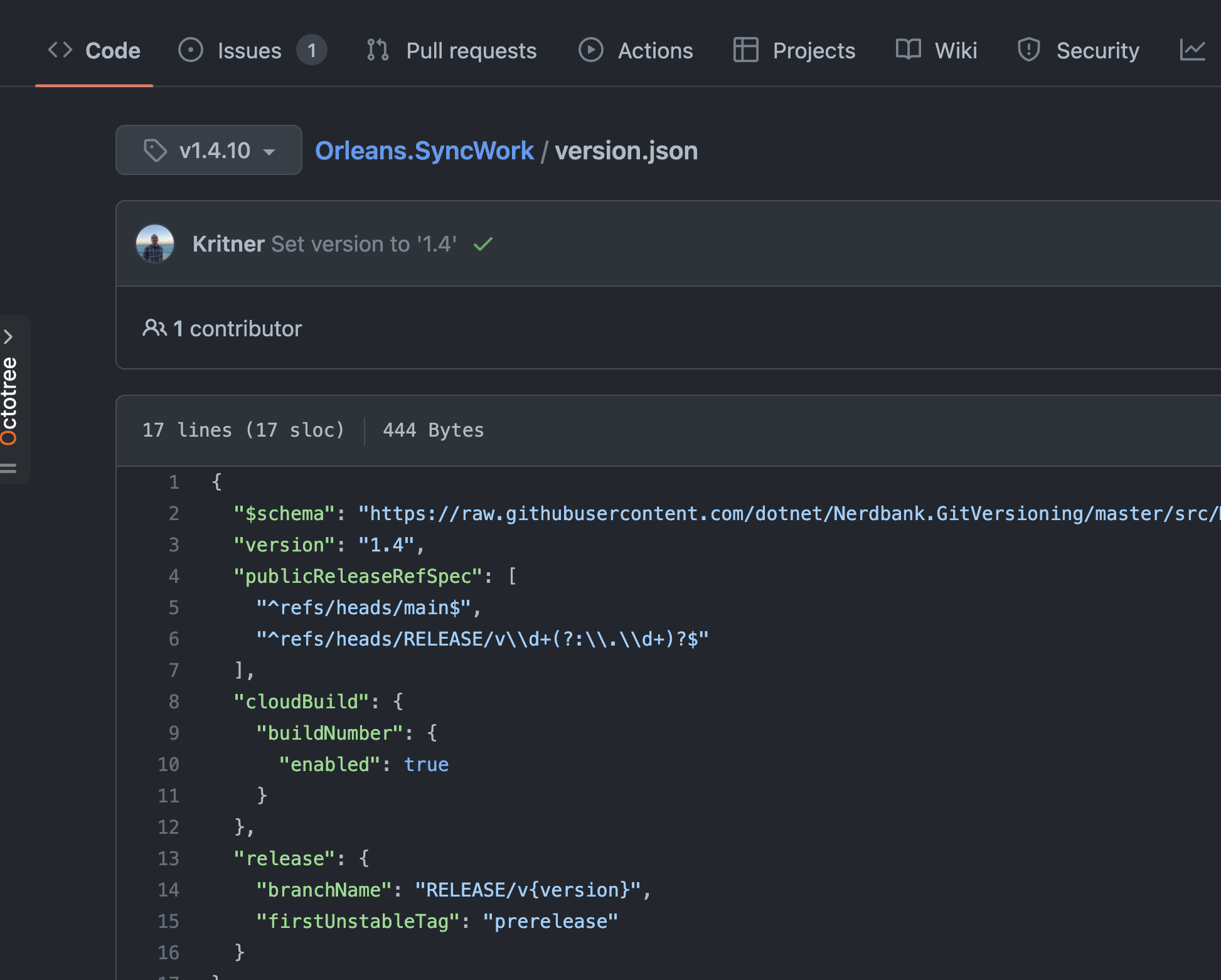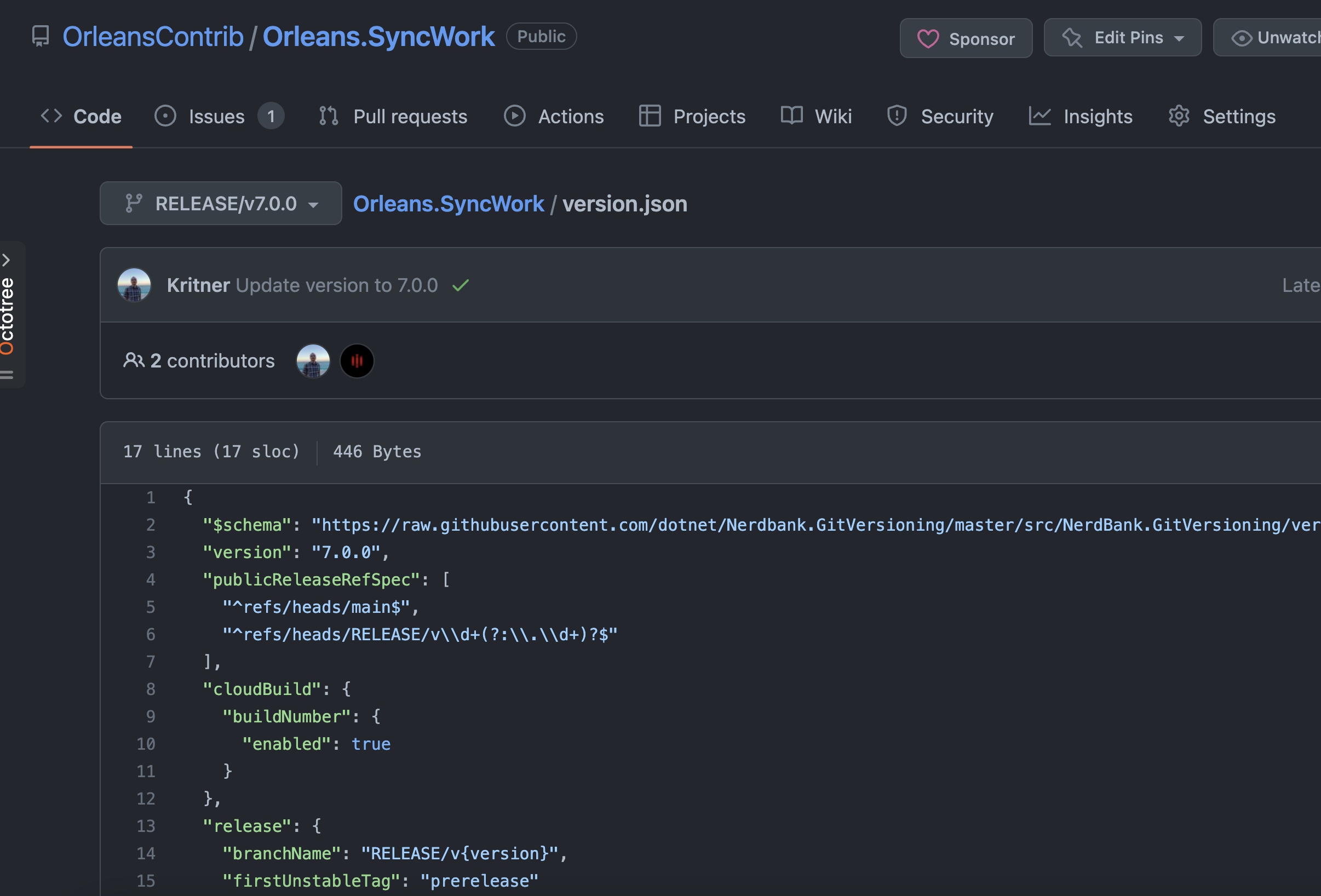This package's intention is to expose an abstract base class to allow Orleans to work with long running, CPU bound, synchronous work, without becoming overloaded.
Built with an open source license, thanks Jetbrains!
The project was built primarily with .net3 in mind, though the varying major version releases support .net6, .net7, and .net8; depending on the package version (should mirror the .net versions).
There are several projects within this repository, all with the idea of demonstrating and/or testing the claim that the NuGet package https://www.nuget.org/packages/Orleans.SyncWork/ does what it is claimed it does.
Note that this project's major revision is kept in-line with the Orleans major version, so the project does not necessarily abide by SemVer, but we try as much as possible to do so. If breaking changes are introduced, descriptions of the breaking change and how to implement against it should be provided in release notes.
The projects in this repository include:
- Orleans.SyncWork
- Orleans.SyncWork.Tests
- Orleans.SyncWork.Demo.Api
- Orleans.SyncWork.Demo.Api.Benchmark
- Orleans.SyncWork.Demo.Services
The meat and potatoes of the project. This project contains the abstraction of "Long Running, CPU bound, Synchronous work" in the form of an abstract base class SyncWorker; which implements an interface ISyncWorker.
When long running work is identified, you can extend the base class SyncWorker, providing a TRequest and TResponse unique to the long running work. This allows you to create as many ISyncWork<TRequest, TResponse> implementations as necessary, for all your long running CPU bound needs! (At least that is the hope.)
Basic "flow" of the SyncWork:
Start- Poll
GetStatusuntil aCompletedorFaultedstatus is received GetResultorGetExceptiondepending on theGetStatus
This package introduces a few "requirements" against Orleans:
-
In order to not overload Orleans, a
LimitedConcurrencyLevelTaskScheduleris introduced. This task scheduler is registered (either manually or through the provided extension method) with a maximum level of concurrency for the silo being set up. This maximum concurrency MUST allow for idle threads, lest the Orleans server be overloaded. In testing, the general rule of thumb wasEnvironment.ProcessorCount - 2max concurrency. The important part is that the CPU is not fully "tapped out" such that the normal Orleans asynchronous messaging can't make it through due to the blocking sync work - this will make things start timing out. -
Blocking grains are stateful, and are currently keyed on a Guid. If in a situation where multiple grains of long running work is needed, each grain should be initialized with its own unique identity.
-
Blocking grains likely CAN NOT dispatch further blocking grains. This is not yet tested under the repository, but it stands to reason that with a limited concurrency scheduler, the following scenario would lead to a deadlock:
- Grain A is long running
- Grain B is long running
- Grain A initializes and fires off Grain B
- Grain A cannot complete its work until it gets the results of Grain B
In the above scenario, if "Grain A" is "actively being worked" and it fires off a "Grain B", but "Grain A" cannot complete its work until "Grain B" finishes its own, but "Grain B" cannot start its work until "Grain A" finishes its work due to limited concurrency, you've run into a situation where the limited concurrency task scheduler can never finish the work of "Grain A".
That was quite a sentence, hopefully the point was conveyed somewhat sensibly. There may be a way to avoid the above scenario, but I have not yet deeply explored it.
Create an interface for the grain, which implements ISyncWorker<TRequest, TResult>, as well as one of the IGrainWith...Key interfaces. Then create a new class that extends the SyncWorker<TRequest, TResult> abstract class, and implements the new interface that was introduced:
public interface IPasswordVerifierGrain
: ISyncWorker<PasswordVerifierRequest, PasswordVerifierResult>, IGrainWithGuidKey;
public class PasswordVerifierGrain : SyncWorker<PasswordVerifierRequest, PasswordVerifierResult>, IPasswordVerifierGrain
{
private readonly IPasswordVerifier _passwordVerifier;
public PasswordVerifier(
ILogger<PasswordVerifier> logger,
LimitedConcurrencyLevelTaskScheduler limitedConcurrencyLevelTaskScheduler,
IPasswordVerifier passwordVerifier) : base(logger, limitedConcurrencyLevelTaskScheduler)
{
_passwordVerifier = passwordVerifier;
}
protected override async Task<PasswordVerifierResult> PerformWork(
PasswordVerifierRequest request, GrainCancellationToken grainCancellationToken)
{
var verifyResult = await _passwordVerifier.VerifyPassword(request.PasswordHash, request.Password);
return new PasswordVerifierResult()
{
IsValid = verifyResult
};
}
}
public class PasswordVerifierRequest
{
public string Password { get; set; }
public string PasswordHash { get; set; }
}
public class PasswordVerifierResult
{
public bool IsValid { get; set; }
}Run the grain:
var request = new PasswordVerifierRequest()
{
Password = "my super neat password that's totally secure because it's super long",
PasswordHash = "$2a$11$vBzJ4Ewx28C127AG5x3kT.QCCS8ai0l4JLX3VOX3MzHRkF4/A5twy"
}
var passwordVerifyGrain = grainFactory.GetGrain<IPasswordVerifierGrain>(Guid.NewGuid());
var result = await passwordVerifyGrain.StartWorkAndPollUntilResult(request);The above StartWorkAndPollUntilResult is an extension method defined in the package (SyncWorkerExtensions) that Starts, Polls, and finally GetResult or GetException upon completed work. There would seemingly be place for improvement here as it relates to testing unexpected scenarios, configuration based polling, etc.
Unit testing project for the work in Orleans.SyncWork. These tests bring up a "TestCluster" which is used for the full duration of the tests against the grains.
One of the tests in particular throws 10k grains onto the cluster at once, all of which are long running (~200ms each) on my machine - more than enough time to overload the cluster if the limited concurrency task scheduler is not working along side the SyncWork base class correctly.
TODO: still could use a few more unit tests here to if nothing else, document behavior.
This is a demo of the ISyncWork<TRequest, TResult> in action. This project is being used as both a Orleans Silo, and client. Generally you would stand up nodes to the cluster separate from the clients against the cluster. Since we have only one node for testing purposes, this project acts as both the silo host and client.
The OrleansDashboard is also brought up with the API. You can see an example of hitting an endpoint in which 10k password verification requests are received here:
Swagger UI is also made available to the API for testing out the endpoints for demo purposes.
Utilizing Benchmark DotNet, a benchmarking class was created to both test that the cluster wasn't falling over, and see what sort of timing situation we're dealing with.
Following is the benchmark used at the time of writing:
public class Benchy
{
const int TotalNumberPerBenchmark = 100;
private readonly IPasswordVerifier _passwordVerifier = new Services.PasswordVerifier();
private readonly PasswordVerifierRequest _request = new PasswordVerifierRequest()
{
Password = PasswordConstants.Password,
PasswordHash = PasswordConstants.PasswordHash
};
[Benchmark]
public void Serial()
{
for (var i = 0; i < TotalNumberPerBenchmark; i++)
{
_passwordVerifier.VerifyPassword(PasswordConstants.PasswordHash, PasswordConstants.Password);
}
}
[Benchmark]
public async Task MultipleTasks()
{
var tasks = new List<Task>();
for (var i = 0; i < TotalNumberPerBenchmark; i++)
{
tasks.Add(_passwordVerifier.VerifyPassword(PasswordConstants.PasswordHash, PasswordConstants.Password));
}
await Task.WhenAll(tasks);
}
[Benchmark]
public async Task MultipleParallelTasks()
{
var tasks = new List<Task>();
Parallel.For(0, TotalNumberPerBenchmark, i =>
{
tasks.Add(_passwordVerifier.VerifyPassword(PasswordConstants.PasswordHash, PasswordConstants.Password));
});
await Task.WhenAll(tasks);
}
[Benchmark]
public async Task OrleansTasks()
{
var siloHost = await BenchmarkingSIloHost.GetSiloHost();
var grainFactory = siloHost.Services.GetRequiredService<IGrainFactory>();
var tasks = new List<Task>();
for (var i = 0; i < TotalNumberPerBenchmark; i++)
{
var grain = grainFactory.GetGrain<IPasswordVerifierGrain>(Guid.NewGuid());
tasks.Add(grain.StartWorkAndPollUntilResult(_request));
}
await Task.WhenAll(tasks);
}
}And here are the results:
| Method | Mean | Error | StdDev |
|---|---|---|---|
| Serial | 12.399 s | 0.0087 s | 0.0077 s |
| MultipleTasks | 12.289 s | 0.0106 s | 0.0094 s |
| MultipleParallelTasks | 1.749 s | 0.0347 s | 0.0413 s |
| OrleansTasks | 2.130 s | 0.0055 s | 0.0084 s |
And of course note, that in the above the Orleans tasks are limited to my local cluster. In a more real situation where you have multiple nodes to the cluster, you could expect to get better timing, though you'd probably have to deal more with network latency.
This project defines several grains to demonstrate the workings of the Orleans.SyncWork package, through the Web API, benchmark, and tests.












